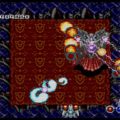Developer: Dual Publisher: Masaya Release: 04/05/91 Genre: Shooter
In the land of video games sometimes you have to something absurd to stand out. The PC Engine has more shooters than you can possibly imagine. To be fair the majority of them are great games. But you can imagine at some point the announcement of yet another shmup becomes routine. Back to my original point, L-Dis has an odd cover that you can’t help but want to take a closer look at and I don’t mean in a Phalanx way. I will admit part of my curiosity regarding L-Dis is because of its weird box art. It certainly grabs your attention, I will give it that. But the underlying game holds your attention with its great art and action. This is a great one folks.
L-Dis has a pretty unconventional story. The two leads of the game are a boy and girl who decide to play in the school’s backyard. As they draw a variety of different creatures an odd creature appears and takes the girl away. As if that were not odd enough, all of the creatures that were drawn come to life, including a ship shaped like a fish. The boy boards the ship rescue his friend.
The weapons system in L-Dis takes a few cues from Gradius. At the start you are presented with three weapon configurations. Each setup affects your primary cannon and the weapons your two options can wield. These range from a tail gun, two-way shot to a 360° shot. Although your choices are few they do a good job of catering to different play styles. The language barrier presents itself when items drop. Each power-up cycles through three weapons, all represented by kanji. They always cycle in the same order so it is easy to learn; the first is speed, the second covers auxiliary fire from your options, and the third grants a bomb. Bombs are unique in that they follow you like options but does nothing until you manually drop them. I suppose this sounds weird but this is a strange game to begin with.
L-Dis reminds me of Air Zonk in that they are bright, colorful games that seemingly throw in everything and the kitchen sink and yet somehow it still makes sense. The game’s premise of a child’s artistic creations come to life means it has more variety than games twice its length. It is very similar to Parodius and Air Zonk in that regard. But while it may share many elements in common with Konami’s many shooters it has a feel of its own. You can have a max of two options and one bomb or carry all bombs if you like. Options also function like shields but are hard to position. The game provides power-ups every few seconds for a reason. It wants you to experiment and switch weapons as the situation dictates. The game provides plenty of reasons to do so as well.
The levels in L-Dis are long and have the pacing of a Treasure shooter. You move from one nutty situation to the next and face frequent mini-boss battles along the way. The game is not as creative with its boss mechanics but comes close. The goofiest ones have the trickiest mechanics and I like it. The game’s humor gives it a non-serious tone however that does not mean it is a pushover. L-Dis is not afraid to pack the screen with enemies and unfortunately that is to its detriment. There are frequent bouts of slowdown, especially late in the game although that is to your benefit. I would not say L-Dis is difficult; I classify it as unpredictable. You never know what lies around the corner and going in with an inappropriate weapon will lead to a rough time. But with its generous respawn system the game is perfectly manageable.
An odd quirk I have noticed in the PC Engine library is that the cutest games always seemed the most technically accomplished and artistically brilliant. The game is bursting with creativity and has something new at every turn. The sprites are large and well animated and every level features at least one layer of parallax scrolling which was uncommon for the system. I like the soundtrack as well. I will say though that even though this is a CD game there are many Hucard games that look better.
In Closing
L-Dis is highly underrated (if rated at all) and the definition of a hidden gem. The presentation is fantastic, the mechanics are simple yet engaging, and the action is measured, challenging and fair. This is an obscure one but far better than a lot of the more popular titles most people go gaga over. I had no expectations going in to L-Dis and discovered a fantastic game.









